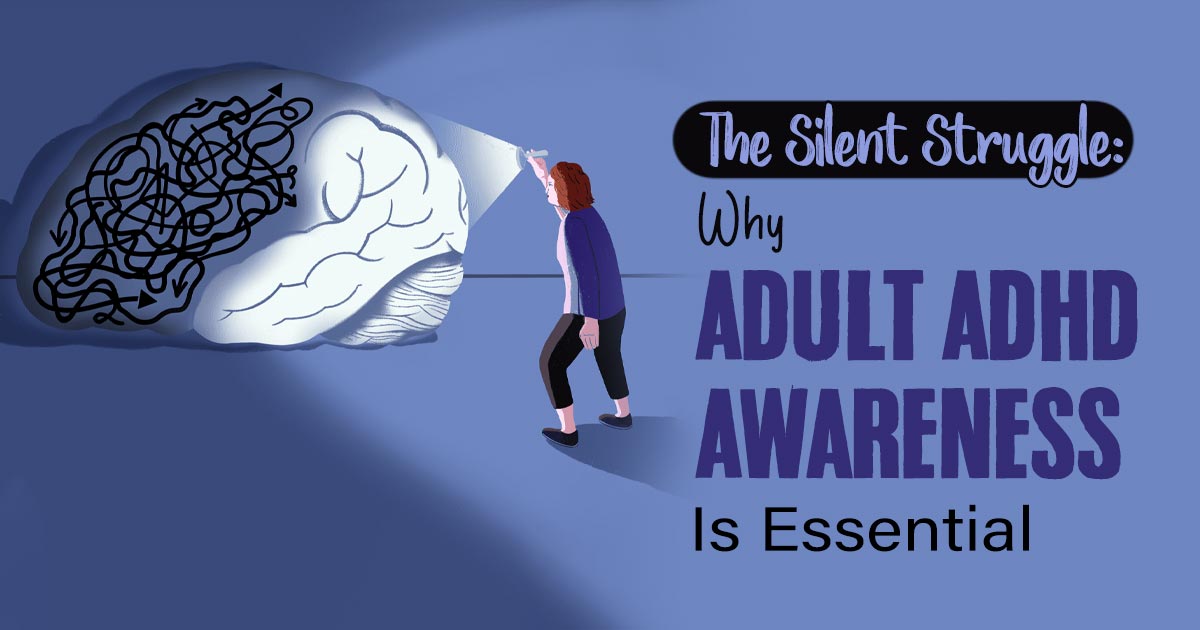Attention-deficit/hyperactivity disorder (ADHD) is often associated with children, but it doesn’t magically disappear as one enters adulthood. In fact, many adults continue to grapple with the challenges posed by ADHD, often without even realizing it. The prevailing misconception that ADHD is solely a childhood disorder has led to many to hide away the signs of ADHD in adults who face the daily struggles it presents, but go undiagnosed.
The Prevalence Of ADHD In Adults
ADHD is not confined to children. In fact, it is estimated that about 60-70% of children diagnosed with ADHD continue to experience symptoms into adulthood. Additionally, studies suggest that approximately 4-5% of adults worldwide are living with ADHD. This prevalence is not a rarity; it is a significant issue that warrants our attention and understanding.
The Common Misconceptions About ADHD In Adults
One of the primary reasons for the underdiagnosis of ADHD in adults is the prevalent misconceptions surrounding the condition. Many believe that ADHD is a condition that is outgrown or cured with time. However, the truth is quite different. ADHD is a neurodevelopmental disorder that persists into adulthood and requires specific strategies for management.
Some of the common misconceptions about ADHD in adults include:
1. ADHD is only about hyperactivity:
While hyperactivity is one of the core symptoms of ADHD, it is not the only symptom. In adults, hyperactivity may manifest differently, often as inner restlessness, racing thoughts, and impulsivity.
2. Adults with ADHD are lazy or unmotivated:
This is a harmful stereotype. Adults with ADHD often struggle with executive function, making it challenging to organize tasks and initiate projects. It is not a lack of motivation but a difficulty in translating intentions into action.
3. ADHD is not a real disorder; it’s just an excuse:
ADHD is a neurobiological disorder with a strong genetic component. It affects brain function, leading to difficulties in various life domains. Dismissing it as an excuse only perpetuates stigma and misunderstandings.
The Hidden Signs Of ADHD In Adults
Recognizing the hidden signs of ADHD in adults is essential to provide proper support and interventions. These signs often manifest in various aspects of an individual’s life:
1. Chronic Procrastination:
Procrastination is common among adults with ADHD. They may struggle with initiating tasks, organizing their work, or managing time efficiently, which can lead to persistent delays in meeting deadlines.
2. Inconsistent Focus:
While adults with ADHD can hyperfocus on tasks that interest them, they often struggle with maintaining attention on tasks that are less stimulating or routine. This inconsistency can lead to performance issues at work or school.
3. Impulsivity:
Adults with ADHD may exhibit impulsivity in various ways, from speaking without thinking, making impulsive decisions, or engaging in risky behaviors.
4. Difficulty With Organization:
Adults with ADHD often struggle with organizing their environment, belongings, and thoughts. This can lead to a cluttered living or working space and difficulties in planning and prioritizing tasks.
5. Forgetfulness:
Forgetfulness is a common symptom of ADHD in adults. They may frequently misplace items, forget important dates, and have trouble following through on commitments.
6. Time Management Issues:
Poor time management skills are a hallmark of ADHD. Adults may have difficulty estimating how long tasks will take, leading to a chronic sense of running out of time.
7. Emotional Dysregulation:
Individuals with ADHD can experience mood swings and emotional hypersensitivity. They may be prone to frustration, irritability, and impulsively reacting to emotional stimuli.
8. Relationship Challenges:
ADHD can have a significant impact on relationships. Adults with ADHD may struggle with active listening, forget important details, and unintentionally hurt their loved ones’ feelings.
9. Restlessness:
While hyperactivity tends to decrease in adulthood, restlessness or a sense of inner agitation is common. Adults with ADHD may have difficulty sitting still or find it challenging to relax.
10. Substance Abuse:
ADHD is often comorbid with substance abuse, as some individuals turn to drugs or alcohol to self-medicate and alleviate their symptoms.
The Importance Of Recognizing The Hidden Signs Of ADHD In Adults
Recognizing the hidden signs of ADHD in adults is of paramount importance, as it not only dispels misconceptions and stigma surrounding the condition but also ensures that those affected receive timely diagnosis and support, enabling them to effectively manage their symptoms, nurture their strengths, and lead fulfilling lives, ultimately improving their overall well-being and the well-being of those around them.
ADHD is not limited to childhood, and its impact on adults can be profound. The hidden signs of ADHD in adults may manifest in various ways, affecting work, relationships, and overall well-being. Overcoming the common misconceptions surrounding ADHD and recognizing these hidden signs is essential for early diagnosis and effective management.
With proper diagnosis and treatment, adults with ADHD can lead fulfilling lives, utilizing their unique strengths and talents while addressing the challenges posed by the condition. Increased awareness and understanding of ADHD in adults are vital steps in ensuring that those affected by this condition receive the support and resources they need to thrive.






















